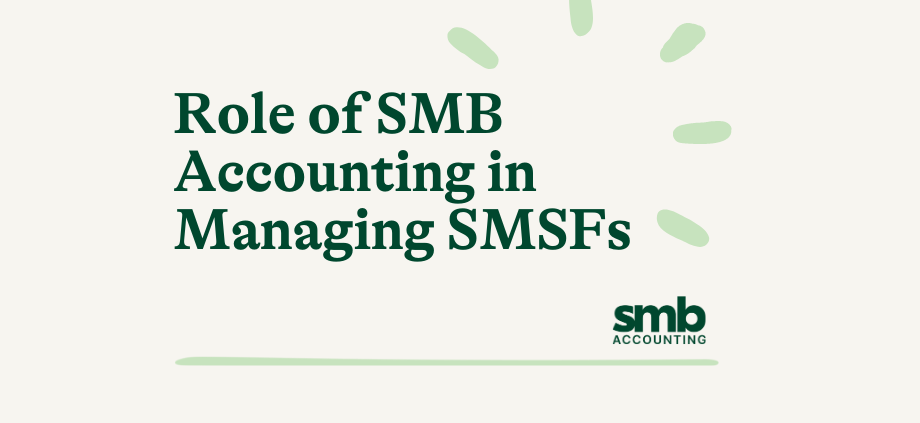The Role of SMB Accounting in Managing SMSFs
In an evolving financial landscape, navigating the complexities of Self-Managed Super Funds (SMSFs) demands not only understanding but also strategic intelligence. SMB Accounting offers a comprehensive suite of services designed to adeptly guide you through the intricate world of SMSFs.
Self-managed super funds (SMSFs) offer Australians more control and flexibility over their retirement savings, empowering them to make investment decisions tailored to their financial goals. However, navigating the world of SMSFs can be complex, with countless rules, regulations, and responsibilities that come with managing your own super fund.
Armed with extensive knowledge and financial acumen, we ensure that your journey through SMSF management is seamless, effective and aligned with your financial goals. By understanding the complexities of SMSFs and enlisting the support of the knowledgeable team at SMB Accounting, you can successfully navigate this intricate financial realm and secure a prosperous future for your retirement.
SMB Accounting Strategies for Effective SMSF Management
1. Basics of SMSFs
Self-managed super funds (SMSFs) are private superannuation funds that individuals can establish and manage independently, providing them with greater control over their investments. Unlike traditional super funds, SMSFs allow trustees to build a diversified and personalised investment portfolio tailored to their specific financial goals and risk appetite. Common features of SMSFs include:
- Structure: SMSFs can have up to four members, and each member is a trustee of the fund or acts as a director of the fund’s corporate trustee.
- Investment choices: Trustees have more control over the investment strategy and can choose from a wide range of assets, including shares, property, cash, and fixed-income products.
- Minimum requirements: To establish and manage an SMSF, individuals need to have a clear understanding of the fund’s objectives, financial risks, and regulations. Additionally, trustees need to comply with the superannuation law, including administration and reporting requirements.
2. Advantages and Disadvantages of SMSFs
There are several benefits and drawbacks associated with SMSFs, which should be carefully considered before deciding whether to establish your own fund.
Advantages:
- Greater control: SMSFs offer more control over investment decisions, enabling trustees to develop a tailored strategy focusing on their specific financial goals and risk tolerance.
- Diversified investment options: Trustees have access to a broader range of investment options, including direct shares, residential or commercial property, and collectables.
- Tax management: SMSFs offer strategies for efficient tax management that can minimise tax liability and maximise retirement savings.
- Estate planning flexibility: SMSFs provide flexibility for estate planning purposes, allowing members to incorporate binding death nominations or reversionary pensions.
Disadvantages:
- Time and effort required: Managing an SMSF can be time-consuming, as trustees must make all investment decisions, monitor regulations, and complete ongoing administrative tasks.
- Costs: Due to the fund’s administration costs and the cost of engaging professionals for support, SMSFs can be more expensive to run than traditional super funds, particularly for lower-balance funds.
- Compliance risks: Trustees are responsible for ensuring the fund complies with superannuation law. Non-compliance may result in financial penalties or the loss of the fund’s concessional tax treatment.
It’s essential to weigh these advantages and disadvantages before deciding if an SMSF is the right choice for managing your retirement savings.
3. Navigating SMSF Regulations
Complying with SMSF regulations is crucial to ensuring your fund remains eligible for concessional tax treatment and avoiding potential penalties. Key compliance aspects that SMSF trustees must adhere to include the following:
- Investment strategy: Trustees must create, adhere to, and regularly review the fund’s investment strategy, taking into account members’ risk profiles, objectives, and liquidity requirements.
- Sole purpose test: SMSFs must be maintained solely for the purpose of providing retirement benefits to members, and trustees must ensure that all investment decisions align with this core objective.
- Reporting and administration: SMSFs are required to submit an annual return, including financial statements, a compliance audit, and various regulatory reports to the Australian Taxation Office (ATO).
- Prohibited transactions: Trustees must avoid specific transactions, such as lending money or providing financial assistance to funds’ members or their relatives.
By staying informed and working closely with professionals like the team at SMB Accounting, trustees can successfully navigate the SMSF compliance landscape and ensure their funds remain on track.
4. SMB Accounting’s Role in SMSF Management and Audits
The team at SMB Accounting offers invaluable assistance for SMSF trustees, guiding you through the complexities of managing your fund and providing expert audit services. By partnering with SMB Accounting, you can expect the following:
- Expert advice: With extensive knowledge of the SMSF sector, our team can provide tailored advice on investment strategy, compliance, and reporting, enabling you to make better-informed decisions for your fund.
- Comprehensive SMSF audits: Our experienced SMSF auditors assess your fund’s financial statements and compliance with superannuation law, ensuring any potential issues are identified and addressed promptly.
- Time-saving: By entrusting the management and auditing of your SMSF to professionals, you can focus on other aspects of your life and business while knowing your retirement savings are in capable hands.
- Risk mitigation: Partnering with the team at SMB Accounting helps mitigate the risk of non-compliance, as our expertise will aid in keeping your fund within the parameters of superannuation law and regulations.
Tackling the Complexities of SMSFs with SMB Accounting
Successfully navigating the world of SMSFs can be a rewarding investment in your future retirement. By understanding the basics and considering the advantages and disadvantages, you can make an informed decision about whether an SMSF is the best fit for your financial needs.
When managing your SMSF, enlisting the support of the knowledgeable team at SMB Accounting is crucial to ensuring your fund remains compliant and achieves your desired financial objectives. Let our accountants in the Sunshine Coast, QLD, guide you through this intricate journey, confidently securing a prosperous retirement for you and your fellow SMSF members.

